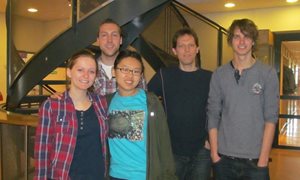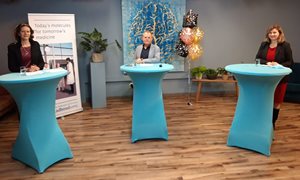
In the latest edition of Advanced Science a multidisciplinary team of RIMLS and Radboud University researchers from the Radiotherapy & OncoImmunology (ROI) Laboratory, the department of Cell Biology, the Institute for Molecules and Materials and the department of Experimental Urology, has published on the development of a novel organoid culturing platform. The platform uses a synthetic biomimetic matrix based on polyisocyanide that can support the long-term growth of mammary and prostate gland organoids. Due to the minimal nature of the matrix, it can be adapted to control differentiation and stem cell capacity of the organoids, making this an excellent model for in depth studies into organ development and for application in disease models.
In the last decade, organoid technology has developed as a primary research tool in basic biological and clinical research.
The reliance on poorly defined animal-derived extracellular matrix, however, severely limits its application in regenerative and translational medicine. Here, a well-defined, synthetic biomimetic matrix based on polyisocyanide (PIC) hydrogels that support efficient and reproducible formation of mammary gland organoids (MGOs) in vitro is presented. Only decorated with the adhesive peptide RGD for cell binding, PIC hydrogels allow MGO formation from mammary fragments or from purified single mammary epithelial cells. The cystic organoids maintain their capacity to branch for over two months, which is a fundamental and complex feature during mammary gland development.
It is found that small variations in the 3D matrix give rise to large changes in the MGO: the ratio of the main cell types in the MGO is controlled by the cell-gel interactions via the cell binding peptide density, whereas gel stiffness controls colony formation efficiency, which is indicative of the progenitor density. Simple hydrogel modifications will allow for future introduction and customization of new biophysical and biochemical parameters, making the PIC platform an ideal matrix for in depth studies into organ development and for application in disease models.
Related news items

RIMLS awards call for nominations
19 October 2021 RIMLS awards several prizes to stimulate and honor our (young) researchers. Upcoming awards are Supervisor of the Year, Best Master Thesis, Best Publication, Best Image and more. Send your nominations now before 24 November 2021. go to page
Miniaturized microfluidic platform for automated epigenetic profiling
6 May 2021 Together with Fluidigm, a US-based company focusing on microfluidics, the team of Hendrik Marks publishes in Genome Research the development of a powerful plug and play ChIP-seq platform for minute amount of cells, such as embryonic specimens or small biopsies. go to page
RIMLS online award ceremony proudly presenting the winners
13 January 2021In this special webinar of the RIMLS New Year Celebration, scientific director René Bindels reviewed 2020 and looked forward to 2021. But more importantly a number of researchers received prizes in the traditional RIMLS awards ceremony.
go to page
RIMLS PhD retreat registration is open
23 January 2020 Yearly, RIMLS PhD candidates gather for the two-day PhD Retreat. Apart from the science, this event is highly valued for the opportunity to meet and get to know fellow PhD candidates during the social activities. Early bird registration and abstract submission deadline: 4 March 2020. go to page
RIMLS awards call for nominations
26 November 2019 RIMLS awards several prizes to stimulate and honor our (young) researchers. Please find here an overview of the upcoming awards. Deadline 12 December 2019. go to page
